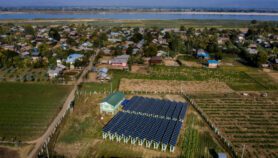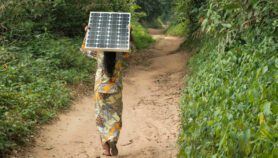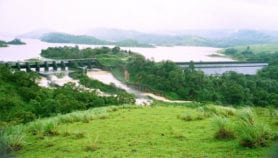By: Wagdy Sawahel
Send to a friend
The details you provide on this page will not be used to send unsolicited email, and will not be sold to a 3rd party. See privacy policy.
A solar energy cooperation plan for Europe and the Middle East and North Africa (EU-MENA) has been proposed to tackle climate change.
The plan, known as DESERTEC and developed by the Trans-Mediterranean Renewable Energy Cooperation (TREC), was presented to members of the European Parliament in Brussels last week (28 November).
It comprises building a network of concentrated solar power (CSP) plants throughout the Middle East and North Africa (MENA) region to meet EU-MENA projected energy needs. High-efficiency electricity grids would be constructed to transfer the power around and across the Mediterranean Sea and Northern Europe.
CSP concentrates solar radiation using large mirrors to create steam that drives turbines or motor engines to generate electricity.
The plan estimates that start up costs of €10 billion will be needed for the initial seven years, with funds coming from EU-MENA countries. Further costs could then be covered by revenue from power sales.
The EU has committed to getting 20 per cent of its energy from renewable sources by 2020. But the total cost of Desertec could reach €400 billion in the next few decades, casting doubt on whether it will be adopted.
"It is unlikely that EU will take up such a huge investment programme that needs a lot of money and a massive scale of capacity building in a region of instability and unresolved problems such as the MENA region," Hassan Moawad Abdel Al, former president of Alexandria’s Mubarak City for Scientific Research and Technology Applications, told SciDev.Net
Wael Hmaidan, executive director of Lebanon-based environmental group IndyAct believes that CSP is the energy of the future. "When the oil reserves are over, and all Uranium is used, we will have no choice but to convert to solar energy and other renewable energy technologies. So why not convert now?"
Klaus Lackner, professor of geophysics at the earth engineering department of the US-based Columbia University told SciDev.Net, "[The plan] is not unreasonable, but it is not quite ready yet. Solar thermal options right now are further ahead than photovoltaic [options], but it will take some time to get the price down."
Others are less certain about the viability of solar energy at present, including Ned Xoubi, chairman of the Nuclear Engineering Department at Jordan University of Science and Technology.
"We must emphasise the fact that many of these sources, such as solar energy are still not feasible technically or economically to provide any significant percentage of the world energy demand," Xoubi told SciDev.Net.
See Letter to the editor.













